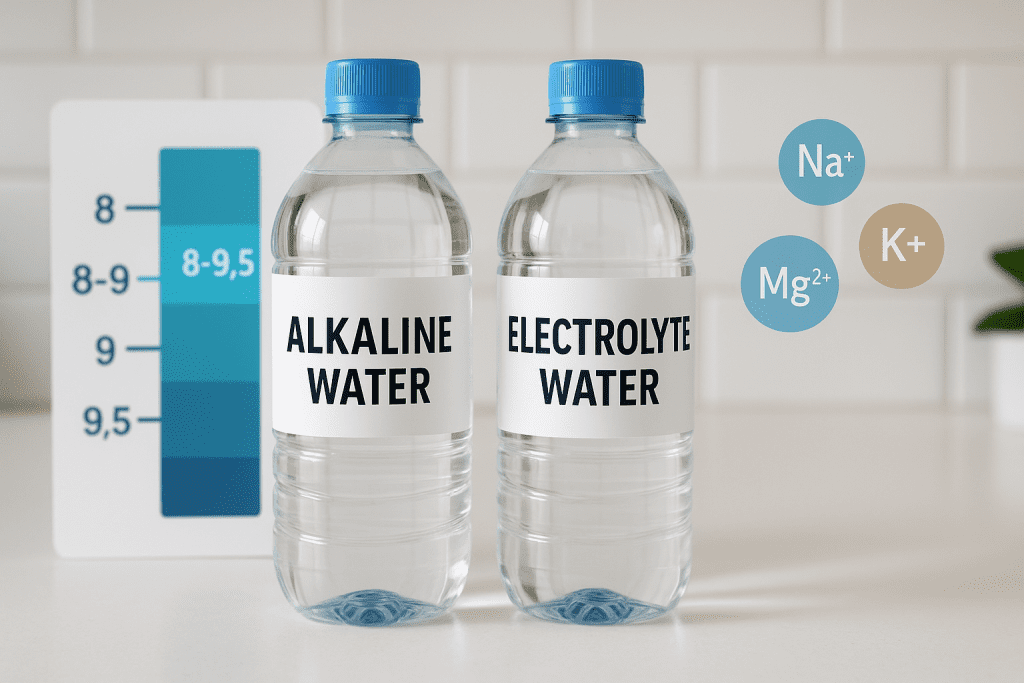Not all waters are created equal – especially when you’re trying to optimize hydration or boost performance. With more people turning to functional beverages, alkaline and electrolyte waters have become popular choices. But how do they actually compare?
This article breaks down the real differences between alkaline vs electrolyte water, their health benefits, and which one is better for hydration.
Quick Answer: Alkaline vs Electrolyte Water
| Feature | Alkaline Water | Electrolyte Water |
|---|---|---|
| pH Level | 7.5–9.5 (alkaline) | ~6 or lower (slightly acidic) |
| Main Components | Calcium, magnesium, potassium | Sodium, potassium, calcium, magnesium |
| Best For | Acid reflux, mild exercise recovery | Intense exercise, illness, heat stress |
| Hydration Power | Moderate | High |
| Scientific Backing | Limited | Stronger |
What Makes Them Different?

Alkaline Water: Higher pH and Mineral Content
Alkaline water has a pH level above 7, usually between 7.5 and 9.5. It’s created either by adding minerals like calcium and magnesium or through an ionization process. The goal? To reduce acidity in the body and improve hydration.
While some claim it helps neutralize acid and support long-term wellness, many of these benefits still lack strong clinical evidence. However, studies suggest it may enhance hydration and help buffer acid buildup after exercise.
Electrolyte Water: Built for Rapid Hydration
Electrolyte water is specifically formulated with minerals that carry an electrical charge – sodium, potassium, magnesium, and calcium. These minerals help regulate fluid balance, support nerve function, and prevent dehydration.
It’s especially useful when you’re sweating heavily – during workouts, hot weather, or illness. Electrolyte water is typically more acidic than alkaline water and often used functionally rather than for daily wellness.
Benefits of Alkaline Water
May Improve Hydration and Acid-Base Balance
Some studies suggest alkaline water can improve hydration more effectively than regular water during intense exercise. Research in PLoS One and other journals notes improved hydration markers and reduced exercise-induced acidosis.
Temporary Acid Reflux Relief
Alkaline water may help relieve acid reflux symptoms by deactivating pepsin, an enzyme involved in acid production. Harvard Health notes this effect is temporary and not a cure.
Exercise Recovery Potential
Because it may support acid-base balance, alkaline water could benefit anaerobic performance and recovery, particularly in high-intensity activities.
Other Claimed Benefits (Less Proven):
- Bone health support
- Immune function
- Metabolic improvement
Benefits of Electrolyte Water
Superior Hydration Efficiency
Electrolytes help your body absorb and retain fluids more effectively. Sodium, in particular, draws water into cells and tissues, improving hydration during and after exertion.
Muscle and Nerve Function
Electrolyte water supports proper muscle contraction and nerve signaling, helping reduce cramps and fatigue during prolonged activity.
Critical During Illness or Heat
In cases of diarrhea, vomiting, or extreme heat, electrolyte water helps replace lost fluids and minerals – preventing dehydration and maintaining electrolyte balance.
Which Is Better for Hydration?
The Science Points to Electrolytes
While both types of water can support hydration, electrolyte water has stronger scientific backing in contexts like:
- Endurance exercise
- Heavy sweating
- Illness recovery
Sodium’s role in fluid balance makes electrolyte water more effective when hydration is critical.
Alkaline Water Still Has a Place
For lighter exercise, wellness routines, or those looking to reduce acid intake, alkaline water can be helpful. Some research suggests benefits in buffering acid buildup during exercise, but overall hydration effects are less consistent than with electrolyte water.
Choosing Based on Your Needs
| Scenario | Recommended Water Type |
| During workouts | Electrolyte water |
| Hot weather | Electrolyte water |
| Recovery from illness | Electrolyte water |
| Mild acid reflux | Alkaline water |
| Everyday hydration | Regular or either based on preference |
Safety Considerations
Alkaline Water
Most people tolerate alkaline water well, but extremely high-pH water (above 9.8) may cause mineral imbalances, especially in those with kidney conditions.
Also, it’s important to note that drinking alkaline water doesn’t significantly change blood pH – your kidneys and lungs tightly control your body’s pH levels.
Electrolyte Water
Generally safe, but overconsumption may lead to imbalances. Those with kidney issues, high blood pressure, or on certain medications should consult a healthcare provider before drinking electrolyte-rich beverages regularly.
Final Thoughts
Both alkaline and electrolyte waters can play a role in better hydration – but they serve different purposes. Electrolyte water stands out as the best option when rapid hydration and mineral replacement are needed, such as during workouts or illness.
Alkaline water may support hydration and offer acid-buffering effects, but many of its wellness claims need more scientific backing.
For most people, clean tap or filtered water is still an excellent everyday option. But when hydration matters most, especially under stress or strain, electrolyte water comes out ahead.
If you’re interested in hydration for performance or recovery, check out our guide to top supplements for muscle recovery or how magnesium supports hydration and energy.

